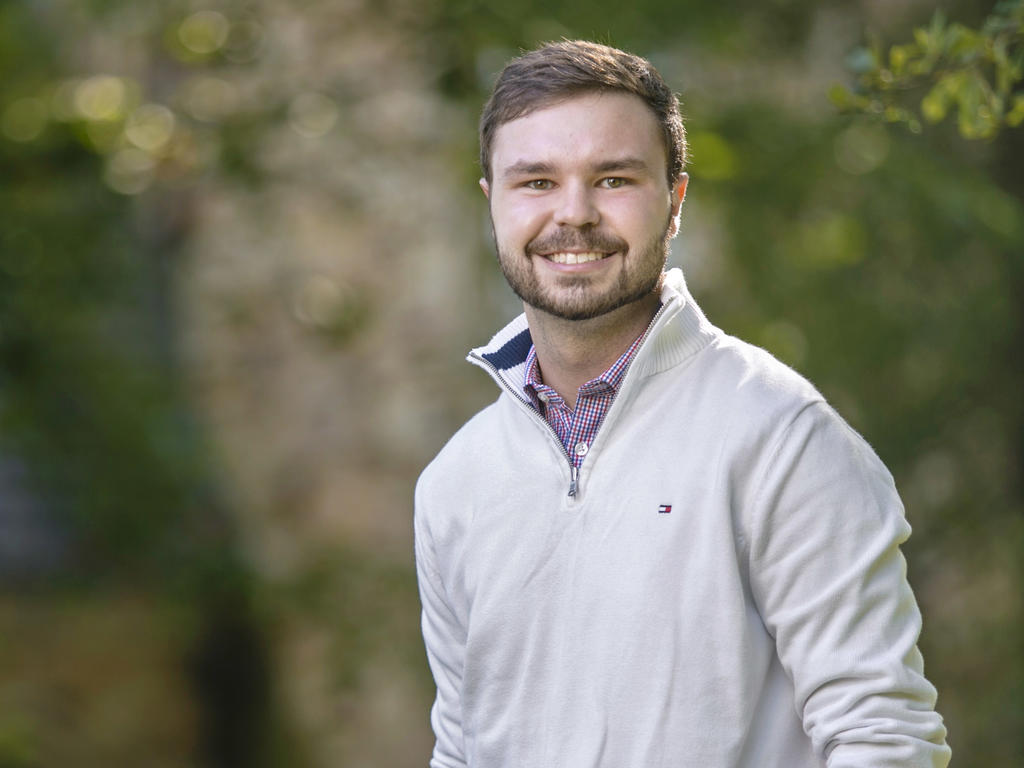Brooks Lamb ’17, a history major from Chapel Hill, TN, serves as the 2016-2017 president of the Honor Council. The Honor Council consists of 17 elected students who interpret and implement the Honor Code, which each student signs at the beginning of their first year at Rhodes. In addition to his presidency, Lamb is active in the Rhodes community as a Bonner Scholar, a research assistant for Dr. Tim Heubner, and an education and outreach assistant for the Overton Park Conservancy. He is a member of Phi Beta Kappa, Omicron Delta Kappa, and Phi Alpha Theta.
How did you choose Rhodes?
When I was in high school, I was interested in attending a small, liberal arts school in the South. I visited four or five different campuses, but I immediately felt most comfortable and welcomed at Rhodes. From professors and students that greeted me on sidewalks to President Troutt speaking to me in the Rat, the people at Rhodes were incredibly kind, and I felt a sense of community here that was unmatched at other schools. I was also looking for a place that was devoted to serving the community. Rhodes definitely fit (and still fits) that description. Once I found out I had been selected for the Bonner Service Scholars Program—a scholarship that offers generous financial aid for service-oriented students who otherwise would struggle to cover the costs of college—my decision was made.
Why did you decide to run for / be a part of Honor Council? What about HC was important to you?
I initially ran for Honor Council because I wanted to get involved on campus, and I felt that serving to uphold the Honor Code—which I view as a foundational aspect of our community—was a good way to do that. I appreciated that the Honor Council was student-led, because it fosters a dynamic of increased accountability. I also admired several of the older Honor Council members who were a part of this organization. Their example further encouraged me to run for the position.
What are your goals in that organization?
As president of the Honor Council, I try to place an emphasis on the values of compassion and justice. The Honor Council is not some ominous body that exists solely to punish students who break the Honor Code. Rather, we seek to nurture the integrity of the campus, to value truth and embrace morality. Everyone makes mistakes, some bigger than others. Instead of acting merely as a punitive body, the Honor Council wants to make sure that we are serving and helping all students who come before us. I also hope that we, as a Council, can continue to remind people that the Honor Code is neither a burden nor a restriction—it is an opportunity. Through this moral code, we can all work on improving our own character while also living in community with 2,000+ other students.
What’s surprised you most during your time at Rhodes?
I think my own personal growth has surprised me more than anything else. When I first came to campus, I was extremely homesick. I loved my friends, my professors, and Memphis, but having grown up on a farm, I missed the rural life that I had always lived. In fact, I often still miss home. But by being uncomfortable, I grew (and continue to grow) as a person. And that same mantra—growth through uneasiness—has applied to other aspects of my time on campus, from the classroom to service sites. By challenging myself and looking at things through new perspectives, I have become a more thoughtful, understanding person.
How do you see your involvement in Honor Council impacting your future outside of Rhodes?
I think that serving on the Honor Council will help me in law school (Currently, I hope to pursue my J.D. and concentrate on environmental law. I would like to use this degree to pursue a career in land conservation.). But more importantly, being involved with the Honor Council will benefit me in my personal life as I continue to nurture my own character and integrity after graduation. Though I’ll soon transition out of my role on the Council, I’ll never stop thinking about what is right or what is just. Thinking about these questions for four years with fellow Honor Council members—all of whom are dedicated, thoughtful, and caring people—has cultivated a strong foundation for me to continue thinking about how I can lead a more virtuous, ethical life.
Compiled by Swaneet Mand ’18
